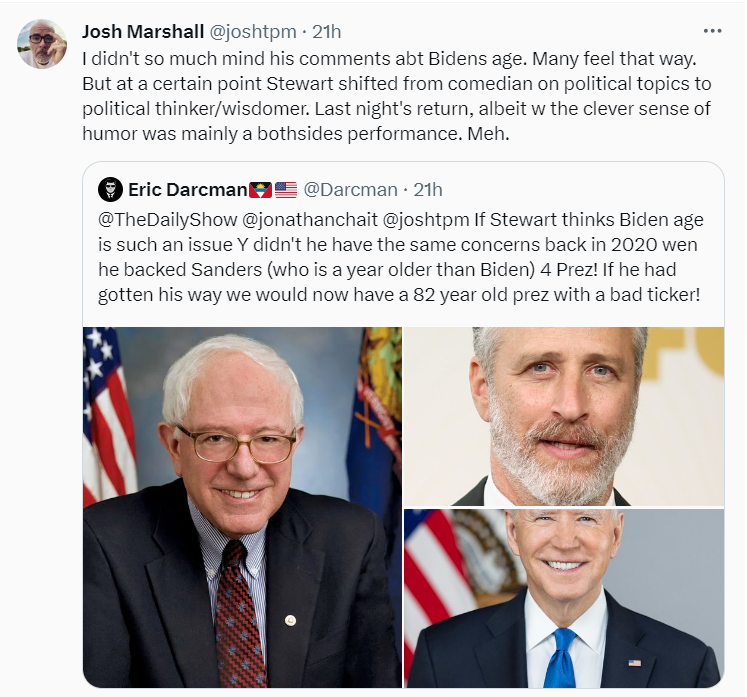As previously mentioned, the GOP has spent a couple of weeks being very nice to Vladimir Putin, between tossing Ukraine to the wolves, threatening NATO, and Tucker Carlson wrapping up his Russia, land of enchantment series.
Me, age 20: "chandeliers in the Moscow subway do not excuse communist mass murder."
— David Frum (@davidfrum) February 16, 2024
Me, age 60: "chandeliers in the Moscow subway do not excuse fascist mass murder."
And none of that even touches Russia's disturbingly high window-related fatality rate; alas, I can find no globally comparable statistics.
— Bret Devereaux (@BretDevereaux) February 12, 2024
Translation: they stand with Russia https://t.co/ycpbMKnWgt
— Norman Ornstein (@NormOrnstein) February 13, 2024
While Tucker says he is angry at America because Russian food prices are so good, 60% of Russians have to spend half their monthly income on food in Putin’s Paradise. https://t.co/pz6ssnuksv
— Ron Filipkowski (@RonFilipkowski) February 16, 2024
My version.
— Jay Rosen (@jayrosen_nyu) February 11, 2024
"Dogged by questions about which country he would best protect if elected — the United States or Russia — Donald Trump dug himself a deeper hole today by publicly suggesting that he would encourage Russian aggression against U.S. allies." https://t.co/NtrTEpFufi
Though it should be noted, this has created some surprising rifts within the party.
UNBELIEVABLE THAT Sen John Kennedy voted against
— Chewbacca (@Chewbacca7222) February 17, 2024
Mayorkas & with Ukraine spending bill. If he’s a RINO
we’re in trouble. He was one of a few Senators to still
have believe in. https://t.co/oeniPofcPL
Ah yes, Russia is so much better than the U.S. with all those cheap groceries and lavish subway stations! The Soviets had a term for people like Tucker: useful idiots.pic.twitter.com/KngvXZtoaG
— Senator Thom Tillis (@SenThomTillis) February 15, 2024
Nearly every Republican Senator under the age of 55 voted NO on this America Last bill
— Eric Schmitt (@Eric_Schmitt) February 13, 2024
15 out of 17 elected since 2018 voted NO
Things are changing just not fast enough.
Ken, your criminal defense lawyers are calling to suggest you spend less time pushing Russian propaganda and more time defending longstanding felony charges against you in Houston, as well as ongoing federal grand jury proceedings in San Antonio that will probably result in… https://t.co/6dfvvqJSfV
— Senator John Cornyn (@JohnCornyn) February 13, 2024
And sadly, this MAGA love has gone largely unrequited.
Russian media mocks Trump supporters as “not very smart,” “rednecks,” and “primitive people” who you have to talk to with “cliches and dumb slogans.” pic.twitter.com/HW4jjWr7Zy
— Ron Filipkowski (@RonFilipkowski) February 17, 2024
Quite an achievement to be too sycophantic for Vladimir Putin https://t.co/R5bx4ZgLdp
— David Frum (@davidfrum) February 15, 2024
Tucker is the only person to have been rejected by the CIA and KGB. https://t.co/ic0Q7xECES
— Daniel Miller (@DanielMillerEsq) February 15, 2024
That's where we were last week. With a handful of exceptions, the party had very publicly gone all in on Russia, which made it a particularly bad time for Putin to shock the world with an especially evil act like...
The Russian authorities are now, I shit you not, saying @navalny’s death was caused by “sudden death syndrome.” If Alexey heard it, he’d make some amazing jokes about it. https://t.co/FUjPeI5jYG
— Julia Ioffe (@juliaioffe) February 17, 2024
Putin, shortly after being told about @navalny’s death, is in a phenomenal mood https://t.co/6FRTDY4gks
— Julia Ioffe (@juliaioffe) February 16, 2024
Take a look at how Russian police behaves with people who just want to pay their respect to Navalny. Even after they killed him they are afraid of him. And they beat those who still believe in him. pic.twitter.com/54JmABcfNb
— Katerina Kotrikadze (@katyakotrikadze) February 17, 2024
Russia: Putin's fascist enforcers continue mass arrests of people who come out to mourn the death of Alexei Navalny, assassinated by the regime. This is in Moscow. The people are just trying to lay flowers at impromptu memorials. pic.twitter.com/Vd0CntEv8V
— Igor Sushko (@igorsushko) February 17, 2024
People being arrested in Moscow for laying flowers for Navalny. pic.twitter.com/8YnLpHcB0s
— Eleanor Beardsley (@ElBeardsley) February 17, 2024
I remember these cops from the protests in Moscow, and the way they flaunt their absolute power over you, the way they rub it in your face. Just makes me shake with powerless rage.
— Julia Ioffe (@juliaioffe) February 18, 2024
Navalny's body is not at the Salekhard morgue where the prison colony said he was taken, his spokeswoman @Kira_Yarmysh said.
— The Moscow Times (@MoscowTimes) February 17, 2024
"It's closed. ... The lawyer called the phone number on the door. He was told ... that they don’t have Alexei’s body." pic.twitter.com/LDWVJ8yxzq
Republicans (with the aforementioned handful of exceptions) have responded with one of the following:
1. Deafening silence
Donald Trump’s Statement on Navalny:
— Ron Filipkowski (@RonFilipkowski) February 16, 2024
.
Elise Stefanik’s Statement on the Murder of Navalny: pic.twitter.com/zIXOsckQvy
— Ron Filipkowski (@RonFilipkowski) February 16, 2024
2. What murder?
it's a mystery, Mr. National Security Adviser.
— John Harwood (@JohnJHarwood) February 17, 2024
but you and Secretary of State Ackman will no doubt get it straightened out shortly. https://t.co/eikmf5lFa5
While OAN host says he thinks Navalny died of “natural causes” in prison and is just being used as a ploy to get aid for Ukraine, Lara Logan seems to be getting attacked by a dog or some other animal. pic.twitter.com/tubChbc0xB
— Ron Filipkowski (@RonFilipkowski) February 17, 2024
3. Yeah, but what about Biden?
As noted by Bradley P. Moss "Navalny was poisoned on Trump’s watch, and imprisoned again on Trump’s watch."Fox Host: I think you could venture to wonder if Navalny would have died, been treated how he was, if there were a different president in office pic.twitter.com/sYfWMKKVid
— Acyn (@Acyn) February 16, 2024
Navalnys death in prison is a brutal reminder that jailing your political opponents is inhumane and a violation of every principle of a free society. Watch the Biden Administration speak out against Putin and his jailing of his leading political opponent while Democrats in four…
— Newt Gingrich (@newtgingrich) February 16, 2024
These people are scum. Navalny was poisoned for speaking out like many Putin critics. He committed no crime and had no due process whatsoever. He was tortured in solitary confinement. Comparing Trump to Navalny is sickening, but typical of these people. pic.twitter.com/JI82ebbKlP
— Ron Filipkowski (@RonFilipkowski) February 16, 2024
As the world reflects on the murder of Alexei Navalny at the hands of Putin, it’s worth remembering that Democrats are actively doing Biden’s bidding as they also try to imprison his chief political opponent, Donald Trump, remove him from the ballot, and ensure he dies in prison. https://t.co/FdLJUR9w4u
— Lee Zeldin (@LeeMZeldin) February 16, 2024
All these false, hollow, empty moral equivalencies from the Putin apologists. Republican Senator supposedly can’t say a bad word about Putin or anything about Navalny because he’s too busy caring about America. What a fraud. pic.twitter.com/u4rmhxrCxD
— Ron Filipkowski (@RonFilipkowski) February 16, 2024
On a related note,the horseshoe tip of the far left has weighed in.
“Biden mourned Navalny’s death. ‘Even in prison he was a powerful voice for the truth’, he said. An interesting statement while journalist Julian Assange, who published truth inconvenient to the US and the West currently rots inside Belmarsh High Security prison while he fights… pic.twitter.com/iWg73MGNgw
— Stella Assange #FreeAssangeNOW (@Stella_Assange) February 17, 2024
And finally...
4. Good riddance to a woke Nazi
Draino & George Papadoplous have been pushing this fake piece of Russian propaganda that their minions have been spreading all day. This isn’t Navalny. It’s Vladimir Ashirkov. He is also explaining his fundraising pitch, not asking for money. This was also 2010. pic.twitter.com/YTvr39tsDB
— Ron Filipkowski (@RonFilipkowski) February 17, 2024
Noted Brexiter.
Why are politicians in the West mourning Alexei Navalny?
— Jim Ferguson (@JimFergusonUK) February 17, 2024
This shows Alexei Navalny attending a Nazi gathering.
He passed away in a Russian detention facility.
Authorities in the West may depict him as a commendable figure, suggesting actions against Putin's regime. What… pic.twitter.com/HHI2Dvw9Bj
Murdoch favorite.
Knowing what we know about Obama,
— Xi Van Fleet (@XVanFleet) February 17, 2024
Question why he praises Navalny
Question who killed Navalny
Question why now
Question who benefits
… https://t.co/TZyPu517MQ
We'll close with this reminder of where the Republican Party used to be. .
Schwarzenegger's message to the Russian people: My father was a Nazi. Don't be like him. Putin is a fascist dictator like Hitler. Don't believe his lies. Don't follow his illegal orders. Don't participate in the illegal war against the people of Ukraine. pic.twitter.com/0dOiazmHXe
— Jamison Daniel (@AntiquarianMuse) February 9, 2024











